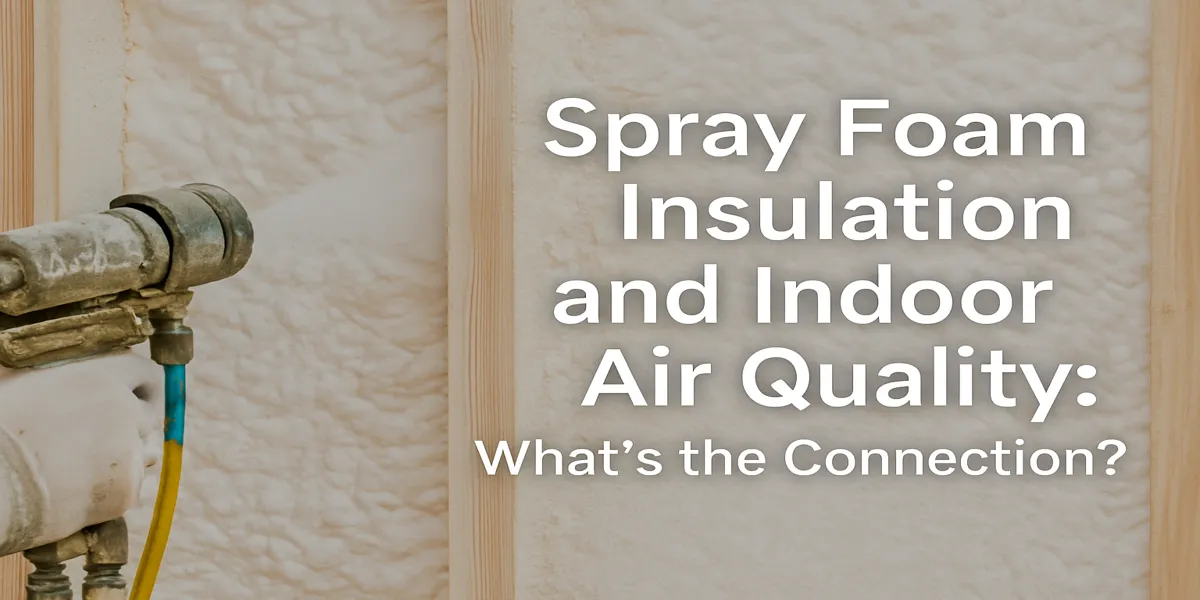When most homeowners think about insulation, they focus on energy savings and comfort. But one of the most overlooked benefits of spray foam insulation is how it influences the quality of the air you breathe inside your home. A well-sealed, properly insulated house can mean fewer allergens, less moisture, and a healthier living space for your family.
In this post, we'll explore how spray foam affects indoor air quality, the science behind it, and what you should know before choosing insulation for your home.
Why Indoor Air Quality Matters
The Environmental Protection Agency has found that indoor air can often be more polluted than outdoor air. With people spending up to 90% of their time indoors, especially in colder or hotter months, the air in your home becomes a crucial factor in your overall health. Poor indoor air quality can lead to headaches, fatigue, allergies, and in some cases, more serious respiratory problems.
This is where spray foam insulation comes in. Beyond energy savings, it creates a tight building envelope that directly affects how air moves in and out of your home.
How Spray Foam Improves Indoor Air Quality
1. Reducing Air Leaks
Traditional insulation materials like fiberglass or cellulose can leave small gaps and seams that allow outside air to seep in. Spray foam expands to fill cracks, joints, and tiny gaps, dramatically reducing air leakage. This limits the entry of outdoor pollutants, dust, and pollen.
2. Controlling Moisture and Mold Growth
Moisture is one of the biggest contributors to indoor air problems. When humid air leaks into your home, it can lead to condensation, mold growth, and musty odors. Closed-cell spray foam provides an excellent moisture barrier, helping to keep crawl spaces, basements, and attics dry. A drier environment means fewer mold spores circulating through your HVAC system.
3. Blocking Allergens and Pollutants
A tightly sealed building envelope makes it much harder for allergens like pollen, dust, and outdoor smoke to enter. Families with asthma or allergies often notice cleaner, fresher air after installing spray foam insulation.
4. Supporting HVAC Efficiency
When your home is better sealed, your heating and cooling system does not have to work as hard. A properly sized HVAC system paired with spray foam helps maintain consistent temperatures and improves ventilation control, both of which contribute to healthier indoor air.
Addressing Concerns About Spray Foam and Chemicals
Some homeowners worry about the chemicals used in spray foam. It's true that during installation, the foam gives off vapors that require proper ventilation. That's why experienced installers always wear protective gear and ensure safe curing conditions. Once the foam has cured (usually within 24 hours), it is inert and does not release harmful fumes into the home.
The key is hiring a qualified, certified installer who follows best practices. A professional installation means your home gets the benefits without the risks.
Real Benefits for Northern Virginia Homes
Homes in Northern Virginia face unique challenges: humid summers, chilly winters, and frequent pollen. Spray foam insulation helps create a barrier against these seasonal problems. For example:
- In spring, sealed attics keep pollen from seeping indoors.
- In summer, closed-cell foam reduces humid air infiltration that causes mold in basements and crawl spaces.
- In winter, spray foam prevents cold drafts and helps maintain consistent, clean airflow.
Is Spray Foam Right for You?
If indoor air quality is a concern for your family, spray foam insulation deserves serious consideration. It creates a healthier environment, reduces allergens, and pairs well with modern ventilation systems to keep your home comfortable year-round.
Every house is different, so the best approach is to schedule a consultation with an experienced insulation contractor. They can evaluate your current insulation, check for air leaks, and recommend whether open-cell or closed-cell spray foam is right for your space.
Conclusion
Spray foam insulation is more than an energy-saver. It plays a vital role in shaping the air your family breathes. By sealing gaps, controlling moisture, and reducing allergens, it contributes to a healthier, cleaner indoor environment. With professional installation, you gain peace of mind knowing your home is efficient and your air is fresh.
Thinking about upgrading your insulation? Contact DMV Foam today to learn how spray foam insulation can improve your home's comfort, efficiency, and air quality.
Ready to Improve Your Home's Indoor Air Quality?
Get a free consultation and discover how spray foam insulation can create a healthier environment for your family.
Schedule Your Free Consultation